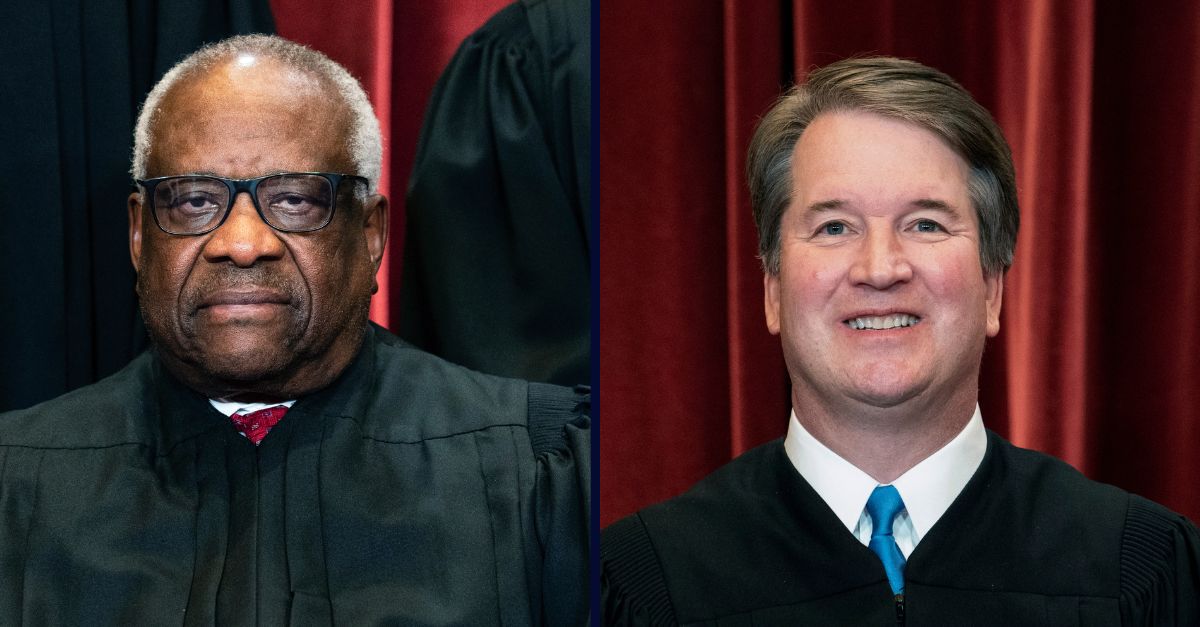Share this @internewscast.com

Left: Associate Justice Clarence Thomas is pictured during a group photo at the Supreme Court in Washington, Friday, April 23, 2021. (Erin Schaff/The New York Times via AP, Pool). Right: Associate Justice Brett Kavanaugh is seen standing during a group photo at the Supreme Court in Washington, on April 23, 2021. (Erin Schaff/The New York Times via AP, Pool).
The Supreme Court has decided in favor of a truck driver who lost his job after a routine drug test showed positive results due to what he claimed was accidental consumption of THC. Justice Clarence Thomas expressed his displeasure with the court’s decision.
The case, Medical Marijuana v. Horn, was brought before the justices to settle a disagreement among circuit courts regarding the scope of racketeering claims. However, Justice Clarence Thomas argued that the court should not have taken on the case.
Douglas Horn, a commercial truck driver, blamed his positive test not on intentional drug use, but on his having taken “Dixie X,” a CBD-based wellness product marketed as being free of tetrahydrocannabinol, or “THC” — the active ingredient in marijuana. CBD is a naturally occurring chemical compound found in the cannabis plant; it is legal and does not, on its own, have the mind-altering properties associated with marijuana.
Horn said he took the product for chronic pain, and that he lost not only his job, but also his insurance and pension benefits as a result of the failed drug test.
Horn brought a legal claim against Medical Marijuana, the makers of Dixie X, under federal racketeering law to recover from “economic harm.” Horn said that the company engaged in mail and wire fraud by indicating the product was free of THC. The Racketeer Influenced and Corrupt Organizations Act (RICO) is a federal law that was initially passed to target organized crime, but also allows individuals to recover triple damages in cases where their “business or property” is injured. RICO does not allow recovery for personal injuries.
The product manufacturers argued that because any economic harm Horn may have suffered was preceded by personal injuries, RICO’s limitation bars his claim. By contrast, Horn argued that even if harm begins as a personal injury, if it then leads to business or property damages, RICO still allows a tort plaintiff to bring a claim.
In a 5-4 decision, the justices sided with Horn on Wednesday. Justice Amy Coney Barrett wrote for the Court’s majority.
“When all is said and done,” Barrett writes, “Medical Marijuana is left fighting the most natural interpretation of the text — that ‘injured’ means ‘harmed’ — with no plausible alternative in hand. That is a battle it cannot win.”
In her decision, Barrett emphasized that the Court expresses no view on whether Horn actually suffered a personal injury by consuming the THC. Rather, she said, the justices confined their opinion to assessing whether the kind of injury Horn claimed fits within RICO’s parameters.
The justices ruled that it did, and Barrett noted that the RICO statute has “undeniably evolved ‘into something quite different from the original conception of its enactors,”” and that now, it is more often used to bring claims against “ordinary businesses” rather than “archetypal, intimidating mobsters.”
Justices Sonia Sotomayor, Elena Kagan, Neil Gorsuch, and Ketanji Brown Jackson joined Barrett’s opinion. Thomas, a frequent author of dissenting opinions, penned a lengthy dissent.
Thomas wrote that the justices should never have considered the case at all, given that RICO “forbids suits based on ‘personal injuries.’” Thomas said that Horn’s case was not only “ill suited” for deciding the question it presented, but that the parties also “inadequately briefed their views” on the key provision of the statute.
Thomas noted that when the case was before the U.S. Court of Appeals for the 2nd Circuit, Horn said he had not suffered a personal injury, then appeared to have changed that argument somewhat when the case proceeded before the justices. As a result, Thomas argued, the majority did not decide the very issue that prompted the justices to grant certiorari in the case.
“We took this case to decide whether economic losses flowing from personal injuries are injuries to business or property for purposes of civil RICO, or merely damages,” recalled Thomas. “That question necessarily assumes the existence of a personal injury as the starting point.”
Thomas went on, spelling out how the majority overstepped its bounds by issuing what could be considered an “advisory opinion”:
I would not decide whether losses flowing from personal injuries are injuries to business or property in a case where no one knows whether the plaintiff suffered a personal injury in the first place. If Horn did not suffer a personal injury, then our resolution of the question presented will have no bearing on this case.
Thomas continued, pointing out several other inconsistencies between arguments advanced at the circuit court as opposed to the Supreme Court.
The historically taciturn justice urged the majority to be more sparing with its decisions.
“Until we are prepared to define the entirety of the phrase ‘injured in his business or property,’ my preference is to say nothing at all,” he wrote.
Thomas noted and quoted fellow dissenter Justice Brett Kavanaugh, who penned his own opinion that was —± joined by Chief Justice John Roberts and Justice Samuel Alito.
“The Court’s limited holding is bound to ‘leave substantial confusion and litigation in its wake,’” Thomas quoted, citing Kavanaugh.
“I appreciate the hesitation to define an entire phrase in a case where neither party offers a complete definition,” Thomas concluded. “But, rather than define one word in isolation, I would wait for a better case.”
You can read the full opinions here.
Love true crime? Sign up for our newsletter, The Law&Crime Docket, to get the latest real-life crime stories delivered right to your inbox.

















